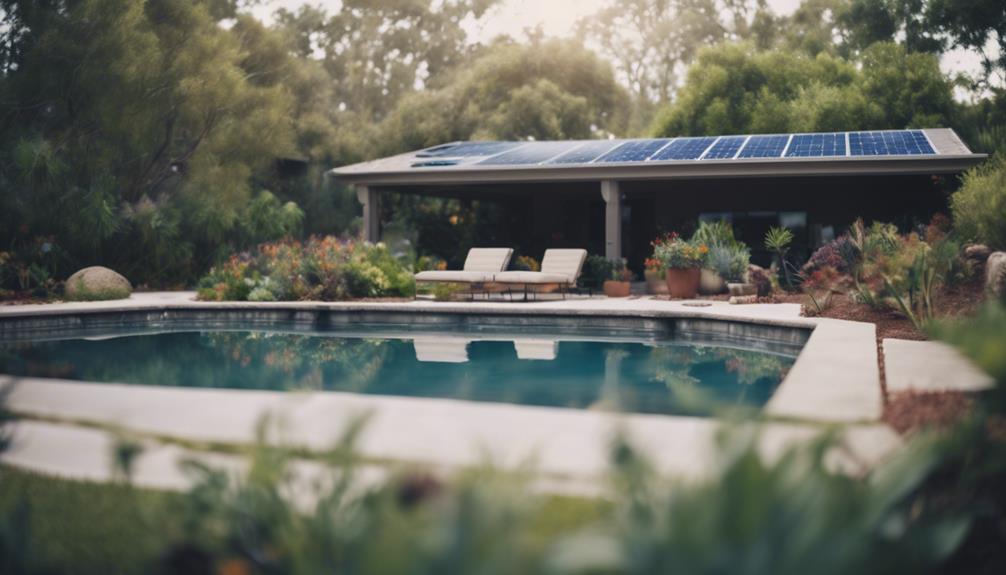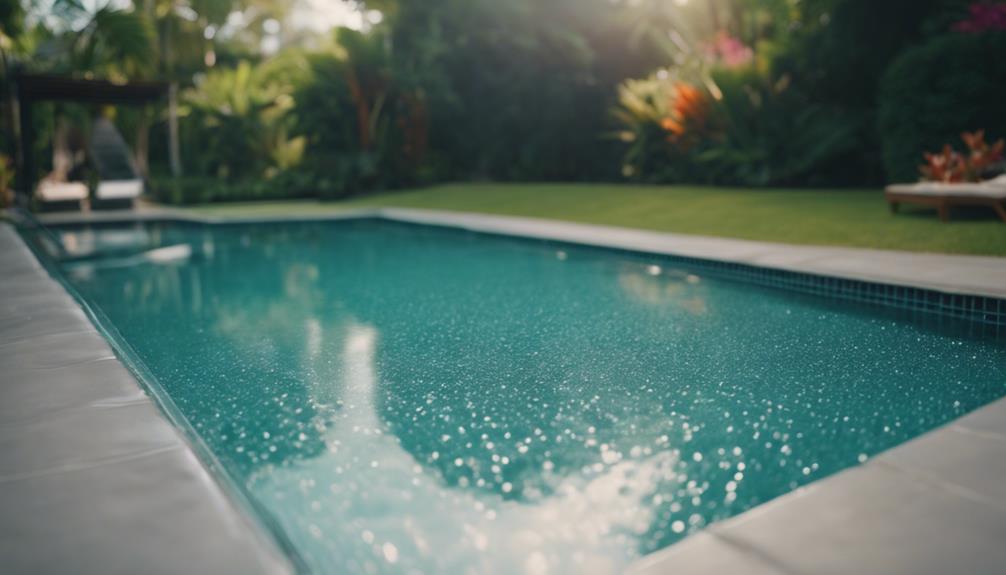Owning a saltwater pool offers numerous advantages, including cost savings in the long run and simpler maintenance routines. While the initial investment may be higher, the reduced reliance on chlorine pucks and gentler water chemistry make it a beneficial choice. The natural chlorine production guarantees sanitation without harsh chemicals, promoting softer hair and skin. Additionally, the eco-friendly aspect of saltwater pools contributes to a sustainable approach to pool maintenance. These benefits highlight why owning a saltwater pool can be a wise decision for a more effective and environmentally conscious swimming experience.
Key Takeaways
- Initial investment higher, but long-term savings on chlorine and maintenance costs.
- Simple maintenance with built-in chlorine generator for consistent water quality.
- Health benefits include softer skin, hair, and eyes with reduced irritation.
- Eco-friendly with fewer harsh chemicals and sustainable chlorine production.
- Regular maintenance of the generator ensures optimal performance for clean water.
Cost Considerations for Saltwater Pools
When considering the cost of owning a saltwater pool, it is important to weigh the initial investment against long-term savings and maintenance expenses.
Saltwater pool systems typically cost 2-4 times more than traditional chlorine systems upfront. However, over time, savings in chlorine pucks and maintenance can help offset these initial costs.
Converting a chlorine pool to a saltwater system is also a viable option, although adjustments may be necessary.
It is noteworthy that salt can potentially be corrosive to pool fixtures and the interior of the pool over time, potentially leading to additional costs for replacing affected components.
Careful consideration of these factors is essential for evaluating the overall cost-effectiveness of owning a saltwater pool.
Maintenance Benefits of Saltwater Pools
Maintenance of saltwater pools is simplified and safer compared to traditional chlorine pools. In saltwater pools, chlorine is generated through a built-in cell, reducing the need for manual chlorine additions. This automation leads to fewer fluctuations in chlorine levels, resulting in more stable water chemistry.
With lower chlorine amounts needed for disinfection, saltwater pools are gentler on swimmers' skin, hair, and eyes. Additionally, the electrolysis process in saltwater pools creates sodium hypochlorite, a milder form of chlorine that minimizes irritation.
Regular maintenance in saltwater pools typically involves checking the pH and salt levels, cleaning the cell, and inspecting for any necessary adjustments, making it a convenient and efficient choice for pool owners.
Chlorine Considerations in Saltwater Pools

Considering the role of chlorine in saltwater pools, it is crucial to understand how the continuous regeneration of chlorine from salt impacts water chemistry and swimmer comfort.
In saltwater pools, a chlorine generator converts salt into chlorine through the process of electrolysis. This natural chlorine production helps maintain water sanitation without the need for frequent manual chlorination. The presence of free chlorine in saltwater pools aids in breaking down harmful by-products and prevents the buildup of chloramines, resulting in cleaner and safer swimming conditions.
Additionally, the lower chlorine levels used in saltwater pools compared to traditional chlorine pools contribute to improved swimmer comfort by reducing skin, hair, and eye irritation. Regular maintenance of the chlorine generator is necessary to ensure top-notch performance throughout the swim season.
Health Benefits of Saltwater Pools
Saltwater pools offer a range of health benefits that enhance the swimming experience for individuals of all ages and sensitivities. The reduced chlorine levels in saltwater pools lead to softer hair, skin, and nails, making it a more gentle option for swimmers.
Additionally, the lower chlorine content helps in reducing irritation and redness in the eyes, providing a more comfortable swim for those with sensitivities. Saltwater pools have a positive pH balance, offering a more natural feel and potentially aiding in skin conditions.
Allergy sufferers and individuals with asthma often find relief in saltwater pools due to the decreased exposure to harsh chemicals, making swimming a more enjoyable and beneficial experience for overall health.
Eco-Friendly Aspects of Saltwater Pools

With a focus on environmental impact, saltwater pools present eco-friendly advantages that set them apart from traditional chlorine pools. Saltwater pools require fewer harsh chemicals, as chlorine is produced through a natural electrolysis process using salt. This reduces the need for storing and handling potentially harmful chemicals, making saltwater pools safer for both swimmers and the environment.
Additionally, the lower chlorine levels in saltwater pools result in reduced skin, hair, and eye irritation, promoting a more enjoyable swimming experience while being gentle on the environment. By minimizing the use of harsh chemicals and providing a healthier swimming environment, saltwater pools contribute to a more sustainable and eco-friendly approach to pool maintenance.
Frequently Asked Questions
Can I Use Regular Table Salt in a Saltwater Pool?
Regular table salt, sodium chloride, can be used in a saltwater pool. However, it's important to use pure, uniodized salt to prevent potential issues. Consult your manufacturer's guidelines for the recommended type and amount of salt for best performance.
Is It Safe to Swim in a Saltwater Pool if I Have Sensitive Skin?
Swimming in a saltwater pool with sensitive skin is generally safe due to lower chlorine levels, reducing skin irritation. However, individual reactions vary. Consult a dermatologist before swimming. Always maintain proper pool care to support skin health.
How Often Should I Check the Salt Levels in My Pool?
Regularly check your pool's salt levels every 1-2 weeks to maintain peak performance. Test kits or digital salt testers can help guarantee levels are within the recommended range of 2700-3400 ppm, promoting safe and efficient operation.
Will a Saltwater Pool System Increase My Electricity Bill?
A saltwater pool system may increase your electricity bill due to the energy consumption of the chlorine generator. However, savings on chlorine products and simpler maintenance may offset this cost. Regular monitoring and adjusting can help manage electricity expenses effectively.
Can I Still Use Traditional Pool Chemicals in a Saltwater Pool if Needed?
Sailing the waters of saltwater pool maintenance may leave you wondering if traditional pool chemicals can still be used if needed. While saltwater pools require specific care, consulting with a pool professional is key for compatibility.
Conclusion
To wrap up, even though the appeal of a saltwater pool may appear irresistible, the concealed expenses and upkeep demands can stir up feelings of regret for unprepared owners.
Despite the assurances of a trouble-free experience, the actuality may leave a sour taste in your mouth.
Therefore, before plunging into the saltwater pool trend, it's crucial to evaluate the financial, maintenance, and health factors diligently to guarantee smooth sailing in the long term.










